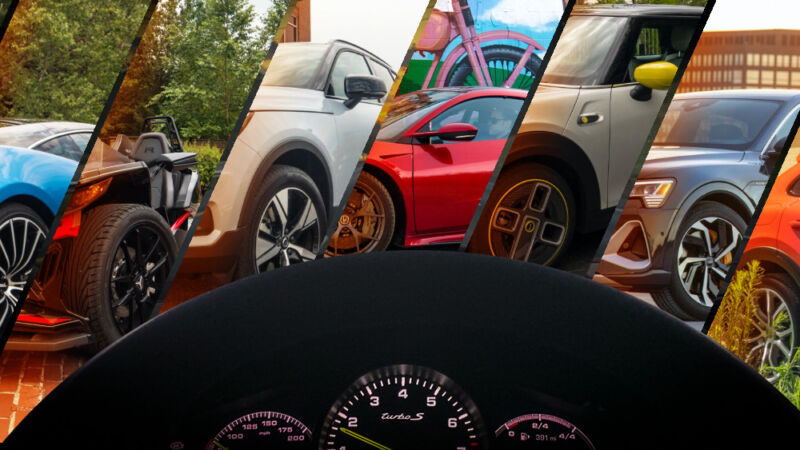
Like most of us, 2020 turned out quite differently than we might have expected back in January. By the end of February, it was clear that COVID-19 was going to be a serious problem as auto shows and drive events started being cancelled en masse. But our local press fleets have remained in operation, and a calendar free of travel has meant more time to test cars here at home. Luckily, sitting in a car by one's self meets the requirements for social distancing, and a car interior can be a welcome change from spending all day every day at home.
All that means we've managed to test drive a respectable amount of new vehicles despite the new realities. These are the highlights of a year spent behind the wheel.
Hybrids, plug-in hybrids, and EVs
Just under half (15 out of 32) of the cars I reviewed this year were hybrids, plug-in hybrids, or battery electric vehicles. I logged the most miles in one of the more exotic hybrids on the list—the Acura NSX supercar. Ohio to Florida in three days remains a memorable trip, but it was hard work. Runner-up would be the Toyota Venza that took us to Cooperstown, New York and back in a day. Unlike the NSX, the Venza had very comfortable seats and adaptive cruise control. This plush crossover was one of my unexpected delights of the year.
I did expect to be impressed by the Hyundai Sonata Hybrid, and yet it still surprised me. It was the only thing that really stood out at this year's Chicago auto show, as the vehicle delivered all that promise and more on the road. It's handsome, it's got some useful driver assists, and it really does get 52mpg (4.5l/100km)—all for less than $28,000.
-
In 2020 we logged more miles in this Acura NSX supercar than anything else, when we ferried it from its factory in Ohio to Daytona, Florida. It's a beautiful car and the powertrain is very interesting, but it would not be my first choice for driving hundreds of miles a day on the highway.Elle Cayabyab Gitlin
-
Most miles in a day would go to this Toyota Venza hybrid, which I drove from DC to Cooperstown, NY, and back again. Unlike the NSX, I would highly recommend the Venza for long road trips.Elle Cayabyab Gitlin
-
A styling sedan that sips fuel? The 2020 Hyundai Sonata Hybrid really impressed us in testing.Jonathan Gitlin
-
Behind the wheel of a preproduction prototype Volkswagen ID.4 electric crossover.Jonathan Gitlin
-
The Volvo XC40 was already a compelling luxury crossover, and the addition of an all-electric powertrain only improves it.Jonathan Gitlin
-
I promise I did not seek out Battery Heights Blvd on purpose. But it was too good a coincidence not to stop and get a photo.Jonathan Gitlin
-
Next year, the Bolt EV will look a bit different because it's getting a styling refresh that should also bring faster DC fast charging, as well as adaptive cruise control (but maybe not Super Cruise, which will only be on the longer-wheelbase Bolt SUV that's also in the works).Chevrolet
-
The Kia Niro EV is another battery electric vehicle that proves the Korean car industry is on top of its game right now.Jonathan Gitlin
-
It looks like any other Mini Cooper, but the presence of this one at an electric charger is a clue to the fact that the Mini Cooper SE is a battery electric Mini.Jonathan Gitlin
-
On the road with the new Polestar 2.Polestar
-
The interior of the Polestar 2 is one of the car's best features.Polestar
-
Audi has given its e-tron electric car a fancy new look—this is the Audi e-tron Sportback.Audi
-
An e-tron Sportback will cost between $70k-$90k depending on trim or options, but I can't think of a better EV interior for the money.Audi
-
This dayglo assault of orange and volt green is the (deep breath) 2020 Porsche Cayenne Coupé Turbo S E-Hybrid. It's the top-of-the-range Cayenne and also a plug-in.Jonathan Gitlin
-
The houndstooth interior trim comes with the Lightweight sport pack. The adaptive front seats are brilliant, as is the racetex-covered steering wheel.Jonathan Gitlin
-
This was a good way to see a sunrise.Jonathan Gitlin
Seven of the 32 cars we reviewed this year were BEVs. We'll have more to say about the Volkswagen ID.4 and Volvo XC40 Recharge in the future, for we spent less than an hour with each. And expect a Ford Mustang Mach-E review in the new year—we just scheduled a week in January with that electric pony. The pandemic postponed the planned facelift for the Chevrolet Bolt EV. The Kia Niro EV is highly competent, and one of the few BEVs to approach Tesla when it comes to range efficiency. The Mini Cooper SE was a hoot to drive, the Polestar 2 impressed with a great interior, as did the Audi e-tron Sportback, although at a price that's another rung up the ladder.
Money no object, however, I'd have the Porsche Cayenne Coupé Turbo S E-Hybrid. And I never thought I'd see myself typing those words. Yes, it's a big SUV, and yes, I'm the kind of annoying writer who never stops telling you the reader how much he dislikes big SUVs. But the Cayenne Coupé's power to weight ratio means it doesn't feel like a big SUV to drive. Its battery pack is big enough to cover most of my normal journeys. And that houndstooth interior might be my favorite of all the cars I've driven this year.
Cars that you wake up early to drive
2020 might not have involved any track days, but there were a few non-electrified performance cars to brighten up the unrelenting weeks of and months of being at home, going nowhere, doing nothing. The prospect of something engaging to drive at least meant a productive outlet for my insomnia—if I'm going to be awake at 4am, might as well go for a drive when the roads are empty, right?
-
I'm not in love with the way the McLaren GT looks, but I did fall in love with the way it drives.Jonathan Gitlin
-
There are some good angles on the car though—I do dig the way it looks from behind.Jonathan Gitlin
-
The silhouette is instantly recognizable as a Porsche 911, although the shape has grown over the years.Jonathan Gitlin
-
For once, I found a red leather interior I could live with. The steering wheel is one of the better ones in the industry—just the right diameter and rim width, while still keeping multifunction controls. Like any 911, the view out the front is framed wonderfully by the bodywork over the front wheels that drops away across the hood.Jonathan Gitlin
-
This is the facelifted Audi R8 V10 performance Coupe quattro. You can tell it apart from the pre-facelift R8 by those three vents above the grille, as well as the shape of the air intakes below the headlights.Jonathan Gitlin
-
Looks are subjective and all that, but I've come to really like the shape of the second-generation R8.Jonathan Gitlin
-
It's totally normal to wake up at 4am and drive 70 miles out to the mountains to go fetch apple donuts when you have a Honda Civic Type-R.Jonathan Gitlin
-
The interior is not subtle, but the seats are so comfortable and so supportive that you won't care how bright they look if you are sitting in one.Jonathan Gitlin
-
Did you know that the US and Canada account for 45 percent of all VW Golf GTI sales?Jonathan Gitlin
-
The Hyundai Veloster is a quirky little car with dramatic styling that reminds me of a baby Audi RS7 from the front.Jonathan Gitlin
-
This is the $25,000 Honda Civic Si.
-
Black wheels, wing mirrors, and a black spoiler are the only visual cues that you're looking at a Mazda 3 Turbo.Jonathan Gitlin
-
The 2020 Polaris Slingshot has an all-new engine and transmission, but it remains for extroverts only.Jonathan Gitlin
-
It looks like nothing else on the road, and if you want to create attention, it certainly fits the bill.Jonathan Gitlin
A bright blue McLaren GT was certainly the most eye-catching. Overriding memories of the GT include the way you can feel the stiffness of the carbon fiber chassis and the directness of the hydraulic steering, as well as the sensation of engaging warp drive as the horizon rushes towards you. A silver Porsche 911 Carrera S was the opposite, a sports car with an invisibility cloak. It's one of the few sports cars I could comfortably live with as an only car.
Splitting the difference, the Audi R8 V10 performance Coupe quattro would be my pick if I had a garage that also had room for something electric for daily use. Its V10 howl provides the drama a supercar needs when you want it, but clad in grey paint (that sparkled orangey-gold in the sunlight) the carapace-like shape was never too conspicuous. It might not be quite as exotic as a McLaren, but it's still a mid-engined supercar that makes you smile.
Driving any one of those three cars is always a treat, but none made me wake up quite as early as the Honda Civic Type-R. Sure, the bright red interior bits are a little garish, and at first the huge side bolsters to the seats seem a little much. But as soon as you find the right stretch of road you realize why they're there. There's not a hint of understeer; the combination of sticky tires, a limited-slip differential, and clever front suspension geometry means that you can turn in and add power without the nose running wide, piling on lateral Gs in the process.
It's not so much that front wheel drive cars can't handle this well, more than they almost never do, and therefore when one does drive as well as the Civic Type-R, that's worthy of celebrating.
Sometimes a transmission spoils the fun
When it comes to hot hatches, the Mk7 VW Golf GTI might be on the verge of replacement but it's still the benchmark for comparison. But get yours with a manual transmission; a dual clutch gearbox didn't shine in the Golf, and it actively detracted from the Hyundai Veloster Turbo. Meanwhile the Honda Civic Si gave a good account for itself with a manual 'box (although I still say save up and get the super duper Type-R).
I'm not sure that the Mazda 3 Turbo is meant to be a GTI competitor, but it is a more powerful version of a mainstream car that many of us think is best-in-class. It's an enjoyable car to drive, but not the sort that encourages you to wring its neck—the six-speed auto in particular keeps things relatively sedate, taking its time to change between gears.
An honorable mention goes to Polaris Slingshot, which yet again turned more heads than anything on four wheels. It too was let down by an automatic transmission; I hear that the 2021 has much improved software but I think I have driven enough Slingshots in DC to have had my fill now.
2020's been a rough year on so many fronts that I don't want to dwell for long on my automotive lows. Having a Hyundai Ioniq stolen was undoubtedly the nadir, but it was recovered undamaged, and even highlighted an upside to the connected car in the process. As for 2021, I make no predictions other than I will finish writing the handful of reviews hanging over from this year by January's end. Hopefully.
https://ift.tt/2KXYek6
Technology

No comments:
Post a Comment